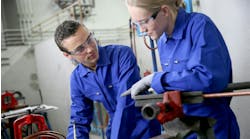Latest from Training
Sponsored
Several comments from readers, generated by last month’s column, got me thinking about what we can do to educate our people in the skills needed to be self-sufficient when working in the trade.
One comment, referencing the statement about lack of books and educational items available in most shops today, brought up some new “reference” books being put together by some tool manufacturers. These reference books purport to simplify the data necessary to assist “visually oriented users in getting the job done right, the first time.” Really?
Have we abrogated our responsibilities to train the next generation of journeymen so completely that the trade equivalent of the ubiquitous “Cliff’s Notes” has become a saleable commodity? Another booklet claims to take “the mystery out of mathematical calculations…” etc. etc. What happened to teaching and learning on the job from more experienced journeymen? What has happened to the trade? Is it apathy, lack of teaching the skills, lack of concern about the craft?
The real truth of the matter is, yes to all of the above. Screeching from the sidelines and leading from behind isn’t a viable course of action today. While there are those of us gray beards that loudly and constantly gnash our teeth and rend our garments in sorrow and frustration at what is befalling our trade, the fact of the matter is that there aren’t nearly enough of us to make a difference any more.
By its very nature, the plumbing/mechanical trade is a physically demanding one and, while some few have managed to get through a career unscathed physically, most have limped into the golden years thankful they can get through a week without massive infusions of aspirin or like medications, at best. The idea of going back to teach trade craft to new hires isn’t a bell ringer for most, but perhaps it should be.
Imparting trade craft
So, what to do? Successful new businesses today are doing the things that they need to do to win in the marketplace. They aren’t as worried about the craft, per se, as they are about getting the work, doing the work and getting the next job. They take whatever personnel they can get to do the work in the most expedient manner possible and move on from there. Some, but by no means all, shops direct their people to educational programs, with limited success.
How does the idea of in house competitions sound? Putting a person’s skills directly against coworkers’ might be one way to generate some enthusiasm for learning the ins and outs of the craft. Learning a new skill from a coworker in a competition is fun and doesn’t come with pressure to perform. It would be something that would be easy to do. In addition, if done in the right atmosphere, it could create solidarity within the company.
Company barbecues with families are always a good idea. Wrap that around the competition and you might have something. Winners might be awarded small tokens or trophies, which at least should make the individual employee proud of his accomplishments. Taken further, consistently evolving skill levels could translate to promotions, raises or other incentives.
Another idea for imparting trade craft would be to get a really good master (someone who has ‘been there…done that’) whether retired or still in the trade and hold short seminars with hands on exhibitions for interested employees. Taking questions from the field on how to handle a problem (such as threading close nipples when you really need them and don’t have any on hand…or removing a stubborn pipe nipple that has broken off in the fitting, without destroying the fitting) would be one way to ensure audience participation. Experienced masters used to teach apprentices and journeymen that type of thing as a matter of course, but don’t any more for any number of reasons.
Taking advantage of manufacturers training programs (Rinnai heaters and Viega Systems come to mind) and sending your best people to them is a good way to improve the skills and education of your crew. Search out avenues of opportunity to broaden your people’s trade education. Thinking about bidding on medical facilities? Getting medical gas certified is a must for your installers. Waiting until you get a job might be waiting too long. The same holds true for clean room work.
All this is not to say that continuing education is dependent on outside stimulus. As an employer in the pipe trades, it is your responsibility to field the best crews you can. You owe it to your clients and you owe it to your company. More than that, though, you owe it to the trade.
The Brooklyn, N.Y.-born author is a retired third generation master plumber. He founded Sunflower Plumbing & Heating in Shirley, N.Y., in 1975 and A Professional Commercial Plumbing Inc. in Phoenix in 1980. He holds residential, commercial, industrial and solar plumbing licenses and is certified in welding, clean rooms, polypropylene gas fusion and medical gas piping. He can be reached at [email protected].
Al Schwartz | Founder
The Brooklyn, N.Y.-born author is a retired third generation master plumber. He founded Sunflower Plumbing & Heating in Shirley, N.Y., in 1975 and A Professional Commercial Plumbing Inc. in Phoenix in 1980. He holds residential, commercial, industrial and solar plumbing licenses and is certified in welding, clean rooms, polypropylene gas fusion and medical gas piping. He can be reached at [email protected].


